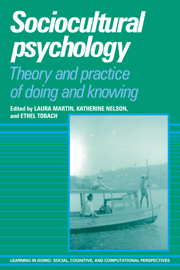Book contents
- Frontmatter
- Contents
- Series foreword
- Preface
- Contributors
- 1 Introduction
- Part I History and culture
- Part II Doing psychology
- 5 Opening vistas for cognitive psychology
- 6 Analysis of developmental processes in sociocultural activity
- 7 Linking thought and setting in the study of workplace learning
- 8 Cultural–historical psychology: A meso-genetic approach
- 9 The abstract and the concrete
- 10 From spontaneous to scientific concepts: Continuities and discontinuities from childhood to adulthood
- 11 The psychology of Japanese literacy: Expanding “the practice account”
- 12 Voices of thinking and speaking
- Part IV Activity in work and school
- Index
8 - Cultural–historical psychology: A meso-genetic approach
Published online by Cambridge University Press: 05 November 2011
- Frontmatter
- Contents
- Series foreword
- Preface
- Contributors
- 1 Introduction
- Part I History and culture
- Part II Doing psychology
- 5 Opening vistas for cognitive psychology
- 6 Analysis of developmental processes in sociocultural activity
- 7 Linking thought and setting in the study of workplace learning
- 8 Cultural–historical psychology: A meso-genetic approach
- 9 The abstract and the concrete
- 10 From spontaneous to scientific concepts: Continuities and discontinuities from childhood to adulthood
- 11 The psychology of Japanese literacy: Expanding “the practice account”
- 12 Voices of thinking and speaking
- Part IV Activity in work and school
- Index
Summary
… we can view the past, and achieve our understanding of the past, only through the eyes of the present. –
E. H. Carr 1961, p. 28.… all experience is an arch wherethrough
Gleams that untravelled world whose margin
fades
Forever and forever when I move. –
Tennyson 1842In the course of the two decades during which Sylvia Scribner and I interacted around questions of culture and cognition, the problem of how to implement the historical aspect of a cultural-historical approach to human mental functioning was a recurrent theme of our discussions. This theme was present, for example, in our joint explorations of cultural variations in thinking, where the history of people's cultural practices, as well as the current intellectual consequences of these practices, occupied our attention (Scribner & Cole 1981). It was present in a different way in the many cases when we worked with people of different ages and conducted learning experiments that permitted us to observe ontogenetic and “microgenetic” changes in the organization of behavior (Scribner & Cole 1972; Cole & Scribner 1977; Mandler, Scribner, Cole, & DeForest 1980). However, while Sylvia wrote explicitly about the concept of history in psychological research (Scribner 1985), historical questions were more often the subject of our informal discussion than the focus of our joint research.
- Type
- Chapter
- Information
- Sociocultural PsychologyTheory and Practice of Doing and Knowing, pp. 168 - 204Publisher: Cambridge University PressPrint publication year: 1995
- 13
- Cited by



